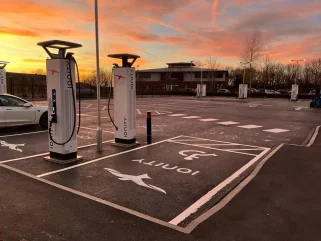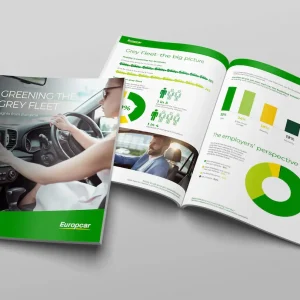
EV charging company Ionity is undergoing a major expansion of its UK network, which it says will help it deliver on its aim to make long-distance EV travelling easier.
Including charging locations either opening this year or under construction, the firm is planning to take its number of sites in the UK from 29 to the mid-80s, and its total number of ultra-rapid chargers from 204 to around 800.
Ionity UK and Ireland country manager Andreas Atkins told Business Car that what seemed like a rapid expansion had in fact been a long time in the making.
He explained: “It takes about two years from when you first set foot on a potential new site to when you can actually open the site, specifically for public ultra-rapid charging. And that’s just reflective of, in the main, things like the planning cycles in the UK, not just this industry but in others – it can take up to a year to get planning permission.
“So, what you are starting to see now in the numbers I talk about, this is like the tip of the iceberg, this is the fruits of work that has been happening across the last two years and more.”
Ultra-rapid focus
Where other charging companies offer a range of different charger speeds to drivers, Ionity has a clear focus on ultra-rapid chargers, capable of speeds up to 350kW. Atkins told us that this stems from the founding philosophy of the company, which began as a joint venture involving car manufacturers BMW, Ford, Mercedes-Benz, and Volkswagen in 2017, with Hyundai also joining subsequently.
He said: “The purpose of Ionity … was to answer what an EV driver could do when they travelled longer distances. It was to help to support this need across Europe – we’re in 24 countries now – to enable that seamless travel for long distance.
“We welcome other charging operators who operate destination charging, and in urban areas, and home and workplace [charging], but our expertise is specifically around ultra-rapid charging en route.”
With fleets such major players in the new EV market currently, we asked Atkins if Ionity offered any specific initiatives for them.
He said: “Whilst our charging hubs are open to all, and whilst we don’t offer specific schemes to certain fleets – there are potentially some pricing schemes we can offer – the way we’ve built our rapid charging hubs will work for certain types of fleet.
“We aren’t only located on motorways – we do find locations around major city ring roads. So, you can accommodate drivers en route, but also in and around the city, which might include taxis and fleets of sorts.”
In response to the request sometimes made by fleets to be able to book slots at chargers, Atkins said: “Whilst we don’t specifically offer pre-booking, the way that we’ve always built up our sites will help for fleet drivers not having to wait.
“Our model has always been around building larger hubs, and our chargers are always the fastest on the market, so the average fuelling time on our chargers is 23 minutes.
“Our model is not around one or two chargers, it’s six, 12, 24-charger hubs, so the throughput is always really quick.”





